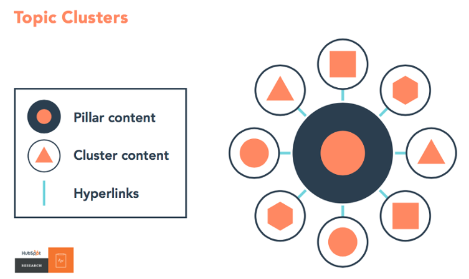Building Topic Clusters for B2B SEO: How to Drive Organic Traffic and Boost Conversions

In the ever-evolving landscape of B2B search engine optimisation (SEO), staying ahead of the competition is crucial for success.
Building topic clusters has emerged as a game-changing approach that not only improves organic search rankings but also enhances user experience and boosts conversions.
In this blog, we delve into the power of topic clusters for B2B SEO and provide actionable insights to implement them effectively for your business.
Understanding Topic Clusters and Their Impact on B2B SEO
Topic clusters are a group of interlinked content pieces centred around a core pillar topic. The idea is to establish authority on a subject matter by providing comprehensive, valuable, and relevant information to users. Search engines recognise this as a signal of expertise and reward websites accordingly in search rankings.
When users search for information, they usually have specific questions or requirements. The goal of topic clusters is to address these queries comprehensively by creating a web of interconnected content. This approach not only ensures that users find the information they seek but also keeps them engaged with your content for longer.

In the context of B2B SEO, topic clusters play a crucial role in capturing the attention of business-oriented searchers. By providing in-depth insights into specific industry-related topics, your B2B company can position itself as an authority in the field, building trust and credibility with potential clients.
Creating a Topic Cluster Strategy
To build an effective topic cluster strategy, start by conducting thorough keyword research. Identify high-intent keywords that align with your company’s goals and your target audience's needs. Utilise keyword research tools such as SEMRush or Ahrefs to find relevant long-tail keywords that represent different facets of your core topic.
For example, if your B2B business specialises in recruitment, your pillar topic could be "Effective Recruitment Strategies for Tech Companies" The cluster pages could cover topics such as "Finding the Right Recruitment Agency" and "How to Utilise LinkedIn for Tech Recruitment."
By organising your content around these clusters, you can create a comprehensive knowledge base that caters to various aspects of your audience's interests. Each cluster page can then serve as a landing page for users searching for specific information related to their needs, improving the chances of conversion.
Implementing Topic Clusters for Enhanced User Experience
The user experience is paramount in B2B SEO, and topic clusters play a significant role in improving it. When visitors land on a pillar page, they are presented with a comprehensive overview of the topic. From there, they can explore more in-depth information on related cluster pages through internal links.
The seamless navigation between cluster pages allows users to easily find the information they are looking for. Moreover, the logical structure of topic clusters helps them discover related content they might not have considered initially, providing added value to their experience.
Additionally, incorporating multimedia elements, such as videos, infographics, and interactive tools, within your topic clusters can enhance user engagement further. Visual content can simplify complex concepts and offer a dynamic learning experience, making it more likely for users to stay on your site and explore multiple pages.
Not only is it great for your audience, but it’s great for search engines, too. Google accounts for the time users spend on your page and how useful they are, so your rankings will rise along with your authority within your B2B niche.
Amplifying Topic Clusters with Content and Backlinks
Once you have a well-structured topic cluster strategy, it's time to develop high-quality content for each cluster page. Here’s how:
- Comprehensive, compelling content - Craft informative articles, blog posts, infographics, and other media that cater to your audience's needs. Delivering value through content establishes your company as an industry authority, fostering trust and credibility with potential clients.
- Building backlinks - Focus on earning backlinks from reputable sources. When other websites link to your pillar and cluster pages, it signals to search engines that your content is valuable and deserving of a higher search ranking. Reach out to industry influencers, engage in guest posting, and leverage your existing network to strategically build backlinks.
- Strong social media - Engaging with your audience on social media platforms can also increase the visibility of your topic clusters. Share your content across various channels, participate in discussions, and encourage users to share and link back to your cluster pages. Social signals play a role in search engine rankings, and by building a strong social media presence, your B2B business can boost organic traffic and conversion potential.
Measuring Success and Optimising for Conversions
No B2B SEO strategy is complete without tracking and analysing its performance. Utilise analytics tools to measure organic traffic growth, user engagement, and conversion rates. Identify the clusters that perform exceptionally well and those that need improvement.
For this, you’ll need the right tools – namely SEO software such as SEMRush or Ahrefs. With a few clicks, you can see what keywords and pages are ranking, as well as how your competitors are doing.
You can then optimise your content and SEO strategies for better results. For example, if a particular cluster page generates a significant amount of traffic but lacks conversions, you may need to focus on the page for better conversion rate optimisation (CRO), introducing powerful calls to action or updating the sales copy to pack more of a punch.
Update underperforming clusters by refreshing content, keywords, and fine-tuning internal linking. Keep monitoring the progress and refining your strategy as needed to ensure continuous growth in organic traffic and, ultimately, an increase in conversions.
Enhance your SEO performance
Building topic clusters for B2B SEO is an innovative and effective approach to drive organic traffic and boost conversions. When you strategically organise content and focus on user experience, your company can establish authority, attract qualified leads, and stand out in a competitive market.
SEO can be hard to tackle alone, so partner with an experienced B2B SEO agency like Angelfish Marketing to improve your results. We work with clients to provide high-quality, measurable, and successful monthly SEO to help B2B companies achieve the results they deserve.
Get in touch with our team today to arrange your free SEO audit and elevate your marketing strategy.

About the Author: Dom Moriarty
AuthorDom Moriarty, Author at Angelfish Marketing
Connect on LinkedInReady to Unlock AI SEO for Your Business?
AI SEO isn’t coming — it’s already here. Capture high-intent traffic and build sustainable pipeline growth.
Get Your Free Audit

